"The first problem many children have with the high-frequency sight words is that most of these have no meaning. Unlike dinosaur, apples, and happy, words like are, is, and have are functional, connecting, abstract words children cannot connect any meaning to. How do you explain, demonstrate, or otherwise make sense of words like of, for and from?"
— Patricia M. Cunningham in Phonics They Use: Words for Reading and Writing
Have you ever tutored a student who kept mixing up words like the, of, and for? I have. Patricia Cunningham suggests ways that we can make these apparently simple words become meaningful for our students, and thereby easier to remember.
But how do we explain these abstract connecting words, when they have little meaning in themselves? Cunningham suggests that rather than providing definitions, we give students the chance to use these words in meaningful ways. We all tend to best remember information that we can actively put to use by ourselves, rather than just being told that same information.
Pictures like the three below might be used to introduce the word of. They should be labeled with the word of printed in boldface or underlined.
 a basket of laundry |
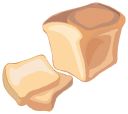 two slices of bread |
 a bunch of grapes |
Many students will need to do further practice with abstract words. See our Practice With Sight Words page for more ideas.
Once your students are comfortable with the word of, they can practice using it along with a word with which it is frequently confused–the word for.

a piece of candy for Josh
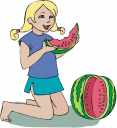
a slice of watermelon for Sarah
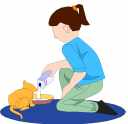
a bowl of milk for Kitty
As each high-frequency word is mastered, you can introduce new ones.
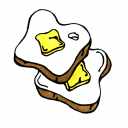
two slices of bread with two pats of butter

a pan of bacon with eggs for Ben
Here are other pictures that illustrate the use of sight words:
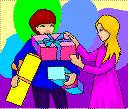
Ken got lots of presents from friends.

Matt came to school from home with his father.
See our other pages on high-frequency words:
High-Frequency Sight Words: The Fry List, Instant Words, Dolch Words, and Word Wall Words
More on Practice with Sight Words
Betsy B. Lee on Teaching Dolch Words
Dolch’s List of Basic Sight Words
See our other pages on word study and phonics:
Working and Playing with Words
Word Families
Return to High-Frequency Sight Words

